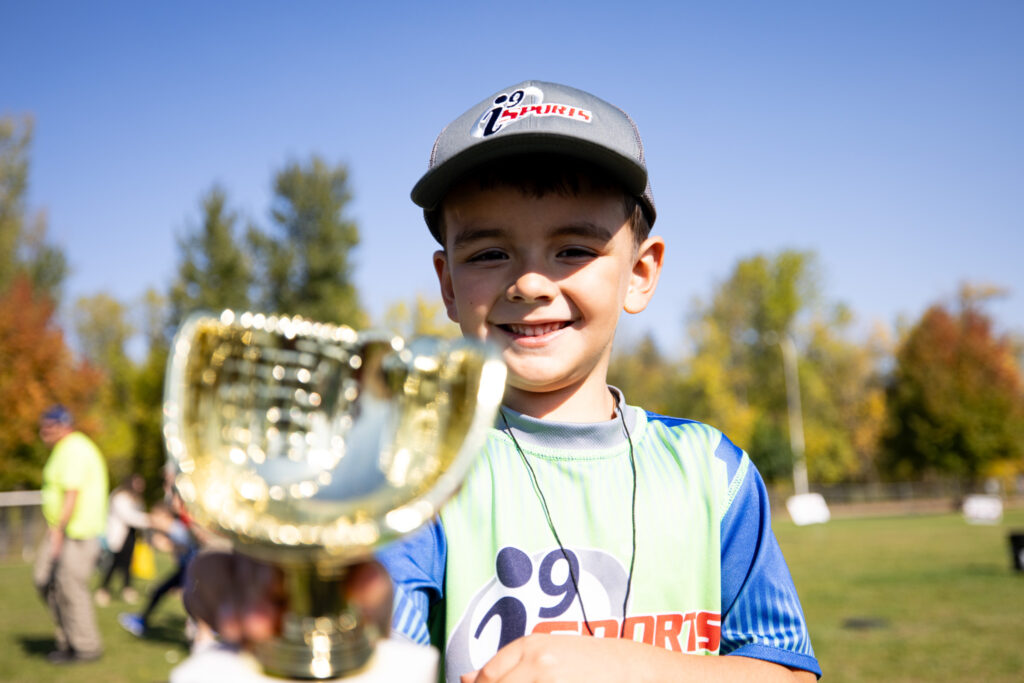Youth Sports Parenting: How to Keep Cool on the Sidelines
There’s nothing quite like watching your child play sports. The thrill of the game, the joy of a goal, the sting of a missed call, it’s an emotional rollercoaster. As a sports parent, how you respond on the sidelines matters. Your reactions have an impact on your child’s youth sports experience.
Kids notice everything— your cheers, your body language, and your tone. The role of a parent on game day is to be a steady, supportive presence. That’s not always easy in the heat of the competition, especially when the stakes feel high. So, here are some helpful reminders to help you be the best youth sports parent and fan:
1. Fill Your Child’s Emotional Tank
Kids perform better and enjoy the game more when they feel supported. You can help by filling their emotional tank through specific praise and positive recognition. Try saying things like:
- “I loved how hard you hustled on that play.”
- “I’m so proud of how you encouraged your teammate.”
- “You kept going even when it got tough, great effort!”
This kind of feedback helps kids build confidence, bounce back from mistakes, and stay motivated. No need to stop with your child, fill their teammates’ tanks, too! A quick “Nice job!” to another player goes a long way in building confidence and a positive team atmosphere.
2. Let the Coaches Coach
It’s tempting to shout advice from the sidelines, “Pass it!” “Shoot!” “Spread out!”, but these instructions confuse players, contradict the coach’s directions, or put pressure on your child. Game time is not the time for in-the-moment coaching. Trust the coaches to do their job so you can focus on yours: being your child’s biggest fan.
3. Respect the Officials, Even When You Disagree
We understand that bad calls can happen. However, yelling at referees models poor sportsmanship, adds tension to the game, and can make coaches not want to work with your child because of your behavior. Instead try this:
- If you disagree with a call, do your best to honor the game, don’t publicly call out the officials from the stands.
- If another parent starts heckling, try not to join in. If you know them and are comfortable with it, gently remind them to stay positive.
- Go out of your way to mention a good call to those around you. It sets the tone for respect and encourages others to follow suit.
Remember: refs are human, often learning, and always trying their best, just like our kids.
4. Respond Thoughtfully to Mistakes
Every athlete, including yours, will make errors. When they do, resist the urge to criticize or correct in the moment. Instead, stay calm and encouraging. A child who just missed a goal or dropped a ball knows they messed up. What they need to hear from you is:
- “Keep going, you’ll get the next one!”
- “I’m proud of how hard you’re trying.”
- “Mistakes are part of the game, just keep playing!”
Your response can make the difference between a player shutting down and one who shakes it off and grows from it. A positive response is also more likely to grow their love for the game whereas a negative or aggressive response is more likely to push them away from sports altogether.
5. Know the Line Between Supportive and Stressful
Here’s a quick gut check: if your cheering feels more intense than your child’s playing, it might be time to step back. Supportive parents cheer for effort, teamwork, and resilience. Toxic behavior (even if well-intentioned) looks like:
- Yelling in a negative or aggressive tone from the sidelines
- Reacting angrily to calls or mistakes
- Pushing for perfection
- Living vicariously through your child’s performance
Before you speak or react, ask yourself:
“What do I want to model right now for my child?”
That single question can help ground you in what matters. It helps to think about what you wanted to hear as a child. Whether it was sports, music, art, or science—did you like it when your parents critiqued your performance, or yelled at you or those around you based on the outcomes of your recital, game, or science fair? Most people, especially children, don’t respond well to that type of feedback or response.
6. Remember to Have Fun
Playing youth sports is about more than wins and losses. It’s about making friends, building confidence, learning life lessons, and having fun. Don’t let sideline stress rob your family of the joy the game can bring. Keep it light, keep it positive, and celebrate the fact that your child gets to play—winning is just a bonus and a byproduct of your child having fun.
The next time you take your place on the sidelines, take a deep breath, cheer loudly (but respectfully), and enjoy the ride. Because your presence, your tone, and your actions matter more than any scoreboard ever will.
Sign up for i9 Sports®
Looking for a better youth sports experience for you and your kids? i9 Sports® offers multiple sports such as flag football, baseball/t-ball, soccer, basketball, volleyball, and tennis for ages 3-14. Our programs focus on skill development and sportsmanship every week to help develop great athletes and great people.
No matter what sport you choose, our leagues, camps, and clinics are designed to grow with your athlete and their skills. Whether your child’s a beginner or it’s their last season, i9 Sports® offers a fun, supportive environment for them to play, learn, and grow.
Find your local i9 Sports® and sign up today!
More Parent Tips
Looking for more game day tips for parents? Check out our partner Positive Coaching Alliance (PCA) and their resource zone.
About the Author

Tyler Munoz
Manager Of Sport, i9 Sports®
Tyler is responsible for creating and implementing national training programs for coaches and over 240 franchisees to achieve the company’s mission to help kids succeed in life through sports.
Tyler grew up in Modesto, California, playing baseball, basketball and football from the age of 5. Sports have always been at the center of his life and have been something that he has dedicated his life to making a positive impact in.
He discovered his passion - supporting coaches to ensure they can provide a quality sport experience to the athletes that they coach during his education at California State University, Fresno. He earned his Master of Arts in Kinesiology – Sport Psychology and his Bachelor of Arts in Political Science with a Minor in Sport Coaching from California State University, Fresno.
After graduating, Tyler spent a year in New Zealand and Australia, where he studied and participated in the two countries’ sport environments, athlete development systems, and coaching models.
After his travels, he joined the United States Olympic and Paralympic Committee’s (USOPC) Coaching Education Department as the American Development Model and Youth Development fellow. Tyler was able to collaborate and coordinate sport development projects with several National Governing Bodies and assist the Coaching Education team with creating and updating resources related to coach training and the American Development Model.
Tyler continued to consult with the USOPC on initiatives related to the American Development Model the Quality Coaching Framework and ultimately, developed an online course, Foundations of the American Development Model. In 2020, he accepted a position with USA Football as the Senior Manager of Coach Education.
During his three years there, he was able to redesign the organization’s coach education certification, which led to USA Football achieving its’ one millionth coach certification in 2022. Tyler has coached football, baseball, and basketball at all levels of sport (recreational, scholastic, national, and international) throughout his life and is passionate about giving back to the communities in which he has lived.
Presentations and Awards:
College of Health and Human Services- Outstanding Project Award
Presented graduate project at the 39th Annual Central California Research Symposium
Olympic & Paralympic Coach Magazine Spring 2020- ADM & Me: Insights in Learning from my USOPC Fellowship
Presented at the USA Football National Conference 2020
Presented at the National Post Olympic and Paralympic Conference of Sport & Science at the Wingate Institute in Israel
What Does Fun Look Like? - Interview with Athlete Era
